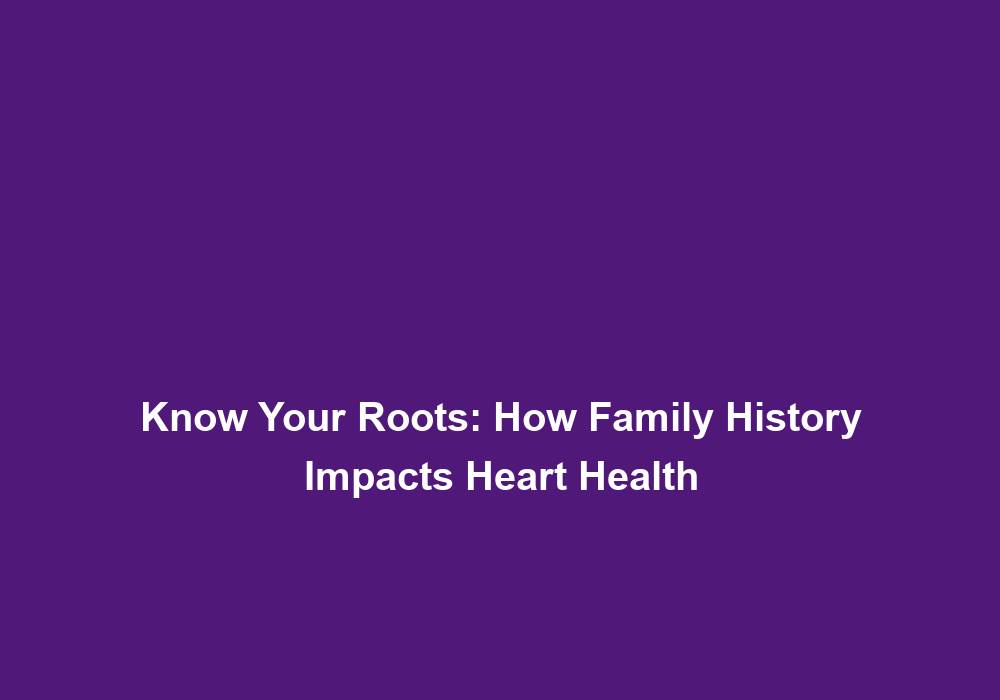Know Your Roots: How Family History Impacts Heart Health
Understanding the impact of family history on heart health is crucial in maintaining a healthy lifestyle. Many individuals tend to overlook the significance of their genetic predisposition when it comes to heart-related conditions. However, by delving into our family roots and comprehending the potential risks and inherited factors, we can take proactive steps towards preventing heart diseases. This article aims to shed light on the profound influence family history has on heart health and provide valuable insights for maintaining a strong cardiovascular system.
The Role of Genetics in Heart Health
-
Family history plays a significant role in determining our risk factors for developing cardiovascular diseases. Certain genetic variations passed down through generations can increase the likelihood of conditions such as high blood pressure, high cholesterol levels, and heart disease. By identifying these inherited risk factors, individuals can better understand their susceptibility and take necessary precautions.
Understanding inherited risk factors is essential for making informed decisions about our lifestyle choices. For example, if we know that our family has a history of high blood pressure, we can be more vigilant about monitoring our blood pressure regularly and taking steps to manage it, such as adopting a low-sodium diet or engaging in regular exercise. By being aware of these genetic predispositions, we can take proactive measures to prevent or manage heart-related conditions.
-
Genetic Testing
Genetic testing can provide valuable information about an individual’s predisposition to heart-related conditions. By examining specific genes associated with cardiovascular health, these tests can identify potential genetic markers that increase the risk of developing heart diseases. This knowledge empowers individuals to adopt preventive measures and make informed decisions regarding their lifestyle choices.
Genetic testing is a useful tool in assessing an individual’s genetic risk for heart diseases. It can help identify specific gene mutations or variations that may increase the likelihood of developing conditions such as familial hypercholesterolemia or hypertrophic cardiomyopathy. Armed with this knowledge, individuals can work closely with healthcare professionals to develop personalized prevention strategies, such as more frequent screenings or targeted medications, to reduce their risk of developing heart-related conditions.
Understanding Family History
-
Tracing Ancestry and Medical History
To comprehend the impact of family history on heart health, it is essential to trace our ancestry and collect detailed information about our relatives’ medical history. Engaging in conversations with parents, grandparents, and other family members can be an excellent starting point for gathering this information. Note down any instances of heart diseases, heart attacks, strokes, or other cardiac conditions that occurred within the family.
Tracing our ancestry and collecting medical history can provide valuable insights into our family’s health patterns. It allows us to identify any recurring heart-related conditions across generations and recognize potential genetic risk factors. Additionally, this information can help healthcare professionals assess our individual risk level and develop personalized prevention plans. By understanding our family’s medical history, we gain a deeper understanding of our own susceptibility to heart diseases and can take appropriate steps to mitigate the risks.
-
Recognizing Patterns and Trends
Analyzing the collected medical history data allows us to identify patterns and trends within our family. If several close relatives experienced heart-related conditions at an early age or if certain conditions consistently occurred across multiple generations, it could indicate a strong genetic predisposition towards these ailments. Recognizing these patterns helps in determining our own risk factors and taking necessary preventive measures.
Identifying patterns and trends in our family’s medical history is crucial for understanding our individual risk factors. For example, if we notice that multiple family members have had heart attacks in their 40s, it may indicate a genetic predisposition for early-onset heart disease. Armed with this knowledge, we can work with healthcare professionals to develop early intervention strategies, such as initiating cholesterol-lowering medications or undergoing regular screenings at an earlier age. Recognizing these patterns empowers us to take proactive measures and make informed decisions about our heart health.
Protecting Your Heart Health
-
Regular Medical Check-ups
Individuals with a family history of heart diseases should undergo regular medical check-ups. These check-ups should include measurements of blood pressure, cholesterol levels, and other relevant cardiovascular health indicators. By monitoring these parameters, individuals can detect any abnormalities early on and seek appropriate medical intervention.
Regular medical check-ups are essential for individuals with a family history of heart diseases as they enable early detection and intervention. Monitoring blood pressure and cholesterol levels allows healthcare professionals to identify any deviations from the normal range and take timely action. Additionally, these check-ups provide an opportunity to assess overall cardiovascular health, evaluate lifestyle habits, and make necessary adjustments to reduce the risk of heart diseases.
-
Adopting a Heart-Healthy Lifestyle
A heart-healthy lifestyle is essential for individuals with a genetic predisposition towards heart diseases. Implementing the following practices can significantly reduce the risk of developing cardiovascular conditions:
- Maintaining a balanced diet rich in fruits, vegetables, whole grains, lean proteins, and healthy fats.
- Engaging in regular physical exercise such as brisk walking, jogging, swimming, or cycling.
- Avoiding smoking and limiting alcohol consumption.
- Managing stress levels through relaxation techniques like meditation, deep breathing, and yoga.
- Maintaining a healthy weight and managing conditions like diabetes and high blood pressure.
Adopting a heart-healthy lifestyle is crucial for mitigating the genetic risk of heart diseases. By following a balanced diet and engaging in regular physical activity, we can manage weight, cholesterol levels, and blood pressure effectively. Avoiding smoking and excessive alcohol consumption further reduces the risk of heart diseases. Additionally, managing stress through relaxation techniques promotes overall cardiovascular health. These lifestyle modifications, coupled with genetic predisposition awareness, significantly contribute to maintaining a strong and resilient cardiovascular system.
-
Consulting with Healthcare Professionals
Individuals concerned about their family history and its impact on their heart health should consult with healthcare professionals. Cardiologists and genetic counselors can provide expert advice, evaluate the risk factors, and recommend appropriate preventive measures or treatment plans based on an individual’s genetic predisposition.
Consulting with healthcare professionals is crucial for individuals with a family history of heart diseases. Cardiologists can assess an individual’s overall cardiovascular health, evaluate genetic risk factors, and provide tailored advice on prevention strategies. Genetic counselors can offer further insight into the genetic components of heart diseases, help interpret genetic test results, and provide guidance regarding potential risks and preventive actions. Collaborating with healthcare professionals ensures informed decision-making and enhances efforts to protect heart health.
Conclusion
In conclusion, understanding our family history and its impact on heart health is imperative for leading a healthy lifestyle. By recognizing inherited risk factors, individuals can take proactive steps to prevent heart diseases. Genetic testing, tracing ancestry, and analyzing medical history all contribute to this understanding. It is essential to prioritize regular check-ups, adopt a heart-healthy lifestyle, and seek guidance from healthcare professionals when necessary. By taking these measures, we can mitigate the risks associated with our family history and ensure a strong and resilient cardiovascular system for ourselves and future generations.







